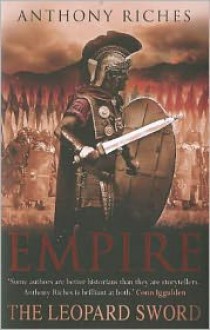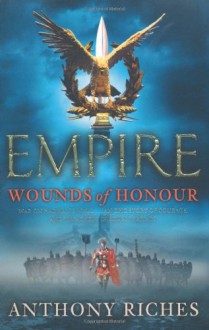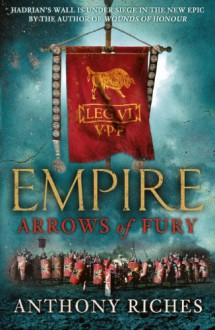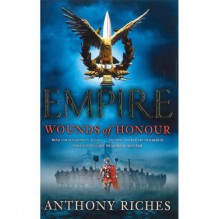
Once again, be warned - if you’re looking for Jane Austin set in 183AD, you better go find some Jane Austen, or Phillipa Gregory, or…or… You know, the stuff that is basically ‘Mills and Boon’ masquerading as Historical Fiction. For girls. Chick Hist Fic. Lit. Etc.
This is the fourth of Anthony Riches’ ‘Empire’ series and the first one to leave Britannia. As the series was clearly originally planned, or commissioned as a trilogy (you read the last chapters of #3 and disagree), I guess it’s natural that he should sell further volumes to the publishers, beginning with a change of scenery. Our Tungrian auxiliaries have left Britannia with the revolting natives seemingly subdued. Or at least the tribes have been put in their place for a while. They are back in what seems to be their original stamping ground in northern Gaul (though I was a little disappointed that more was not made of this being back on home territory). Whilst it is trumpeted as a ‘different world’ in the book blurb, it isn’t really. They’ve basically just swapped one hostile country with another and the antagonists wherever they are, want them gone, dead, preferably both. The Ardennes forest is puffed up to be perhaps a more forbidding place, than the forests of (what is now) Scotland and some of the passages set in the forest are really very excitingly tense. The main difference here, is the nature of their opponent. A bandit, freedom fighter, soldier, chieftain known as ‘Obduro.’ His schtick is that no one (apart from the few close confidants he has) know what he looks like. And those who do know what he looks like, don’t know for long, if you get my meaning? This is because he wears a mask of an iron cavalry helmet at all times he is seen in public. Oh, and has a ‘Leopard Sword.’ Again, that was an interesting development that, despite it being the title of the book, wasn’t really picked up and run with as much as I’d have liked.
For all the action has moved, some things remain the same. There is still a rather unhealthy preoccupation with testicles, their own and each other’s. Eyebrows, rising minutely, imperceptibly, quizzically, or noticeably, questioning, are clearly still a Roman soldiers best way of communicating emotion. And Anthony Riches still doesn’t seem to have found an editor with 20/20 vision. Oh, and in the Audible version I listened to, obviously aristocratic Romans have speech impediments and/or are effeminate. The more aristocratic, the worse the impediment, you get the idea.
If you liked and enjoyed (as I did/have) the previous trilogy, you’ll find nothing not to enjoy here. It is more of the same, with a few extra dimensions added. A more complex plot, maybe as well. Not exactly complicated, but compared with previous outings, more varied, even nuanced. There are still fights, raids and battles, often to the death, but with a more developed undertone - if I can describe it that way. I’m not going to say it’s better (or worse) for that, compared to what I found most appealing in the first three books, which was their rather more straight-ahead story-telling. The only subterfuge there was the fact that one of their number was (and still is actually) not who he wants it to be known he is. Marcus Valerius Aquilais is, in essence, still in hiding, just hiding in plain sight, with the Tungrian Auxiliaries and now doing it in Tungria. His enemies back in Rome have tried a couple of times to find him, but have been unsuccessful. Not because he has tried to lay low and merge in with the background, quite the opposite. But because his friends have had his back for him, while he constantly throws caution out with the bathwater. None of that gets in the way too much here either. The mystery man ‘Obduro', knows who he is really and knows the consequences for him of the knowledge getting out, but nothing really comes of it apart from some taunting.
The idea of the mystery rebel in the face mask, whom no one knows the identity of, even his own fellow rebels, is an intriguing one and is handled pretty well here. However, it could have been better and had perhaps more weight, more punch and been a bigger shock when revealed (who it was) if it hadn’t all been contained within the book. By that I mean, if the masked person had been related to someone or something from the preceding books (hope I’m not giving too much away here), instead of being someone we meet in ‘The Leopard Sword’ and leave in 'The Leopard Sword' (I am nearly through the next book, and there has been no mention, or hint, of anything to do with the masked person in that.
Don’t get me wrong, this is an enjoyable thundering bull in a china shop of book. Neither Anthony Riches nor his Tungrians take any prisoners with the style of writing or fighting. I’d say you’re either going to like it or not. I can see opinions being divided quite sharply on this. How many would begin by reading this one, I can’t say. The shift in scenery for the Tungrians would at least give new readers a chance to begin here, as do many of the characters. Long-term readers, will again find themselves on the same familiar ground as the characters are (the Tungrians are back where they came from - you see what I did there?). The question of who will read this book, is easy to answer. Men. I can’t for the life of me think a woman would read this, or if she did so by accident, stick around after the first barrack room exchange or the first description of the preferred interrogation practices of either the barbarians or Romans.
It would have had four stars, if the expressing of every conceivable emotion by eyebrows shooting hither and thither around a character’s head, were reduced. Also, strangely for the start of the rest of the series, after the #3 was clearly written to end a trilogy, everything here does all end rather completely and with even less dangling ends, than even 'Fortress of Spears.' Which ended like a trilogy might end, but where the author got the nod from the publisher for more while he was doing the edits. With this ending, I imagined the camera pulling back from the final scene, an unseen, off-camera hand slowly closing the door (you've seen it done), voices inside to fade, and we are left to imagine how the characters' lives continue without us. If I hadn't already bought #5, 6 and 7, with #8 on order, I might go along with the above scenario. But as I have them (apart from #8) sat on the shelf over there, I do find the ending a little more than mystifying. Unless he finished up without knowing if the option for more was going to be taken up. Never mind, go read it, see what you think.
 Slower to get going compared to the first book [b:Wounds of Honour|6911710|Wounds of Honour (Empire, #1)|Anthony Riches|https://images.gr-assets.com/books/1347315049s/6911710.jpg|7137262], and otherwise it's more of the same.
Slower to get going compared to the first book [b:Wounds of Honour|6911710|Wounds of Honour (Empire, #1)|Anthony Riches|https://images.gr-assets.com/books/1347315049s/6911710.jpg|7137262], and otherwise it's more of the same.
 Log in with Facebook
Log in with Facebook 









